From preparing Portland theater venues for Broadway plays to selling arts and crafts from Africa, graduate students in the Arts and Administration Program had eventful summers with a diverse array of internships.
Each student completed a 200-hour internship over the summer. Prior to the experience, they explored career paths and received help finding relevant internships in the preliminary winter term course Internship I: AAD 604.
“Ultimately, it’s their responsibility to secure [the internship],” instructor Kristin Grieger said. The class “provides the support to help them do that, but ultimately it’s them securing it. It’s great practice for the job search.”
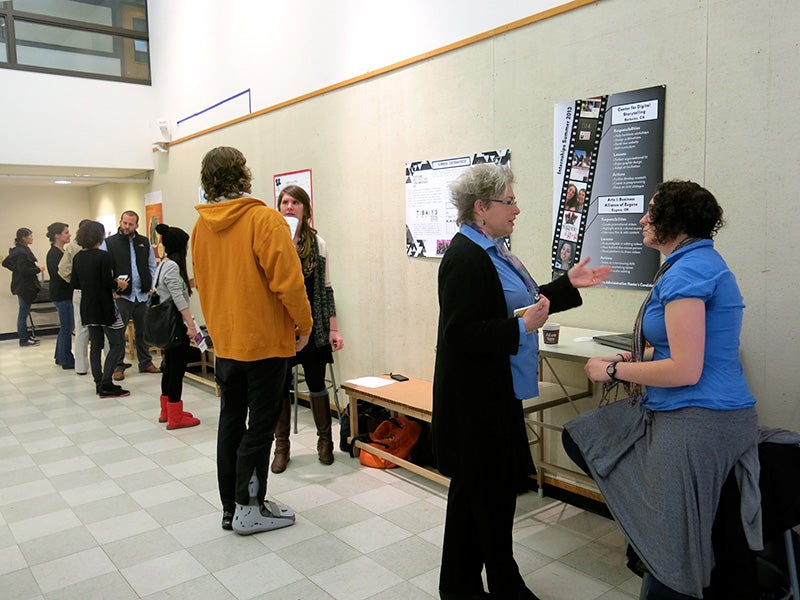
Above: Graduate students in arts management presented their internship experiences to a gathering of faculty members, staff, and fellow students. Photograph by Emerson Malone.
After the internship, students enroll fall term in Internship III: 604, which allows them to synthesize key lessons of the experience. In many cases, the internships can influence a student’s second-year thesis research and career plans.
The interns gathered in Lawrence Hall in mid-November to showcase their summer internships in arts administration. Performing arts, media management, community arts, and museum studies are among the concentrations offered by the program.
Annie Salamunovich worked with Portland’5 Centers for the Arts, the umbrella organization that manages five of Portland’s theater venues. The theaters’ summer events included musical acts like The Monkees, comedy acts, and Broadway plays. She helped with donor development, artist relations, ticketing and customer service, and overall revenue generation.
“I did everything from expense analyses, which I find super fun and no one else does, to working backstage during Broadway tours and everything in between,” said Salamunovich, who plans to graduate with a focus in performing arts management. “I loved all the variety and getting my finger in every pie possible.”
Her background in accounting and performing arts allowed her to research each venue’s income, which will be instrumental for the company’s future budgeting and policymaking.
“They’d never actually sat down and figured out how much it costs to open up the door by venue. I was also able to figure out how much they were spending on each user versus how much they were bringing in and look at the gaps there,” she said.
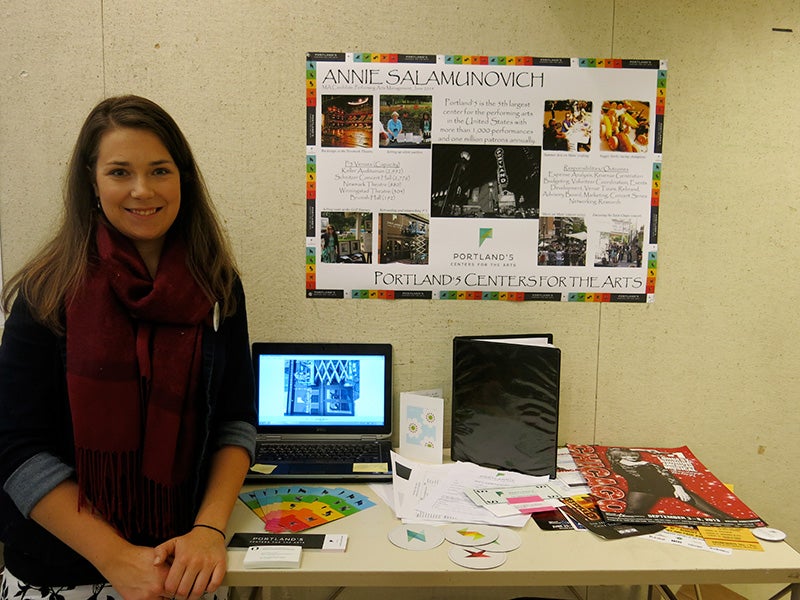
Above: Annie Salamunovich interned with Portland’5 Centers for the Arts, helping research the budgeting and expenses of five Portland venues. Photograph by Emerson Malone.
James Walugembe used his skills in marketing arts and museum exhibition classes for his internship with Swahili Imports, Inc. The Eugene-based company sells handmade African arts and crafts and directly supports artisans in Africa.
“Because I’m from Africa, I looked around before the internship and I came to know this company,” said Walugembe, who is originally from Uganda. “Apart from baskets, they have jewelry made in Africa, set stones, wooden stuff, [and] metal in different styles. Each of the items represents the culture of Africa.”
Walugembe’s responsibilities included receiving online orders, preparing them for shipping, and organizing an exhibition for the company’s annual summer garage sale. He is a master’s candidate in media management and is researching how social media can be used to market African art in the U.S.
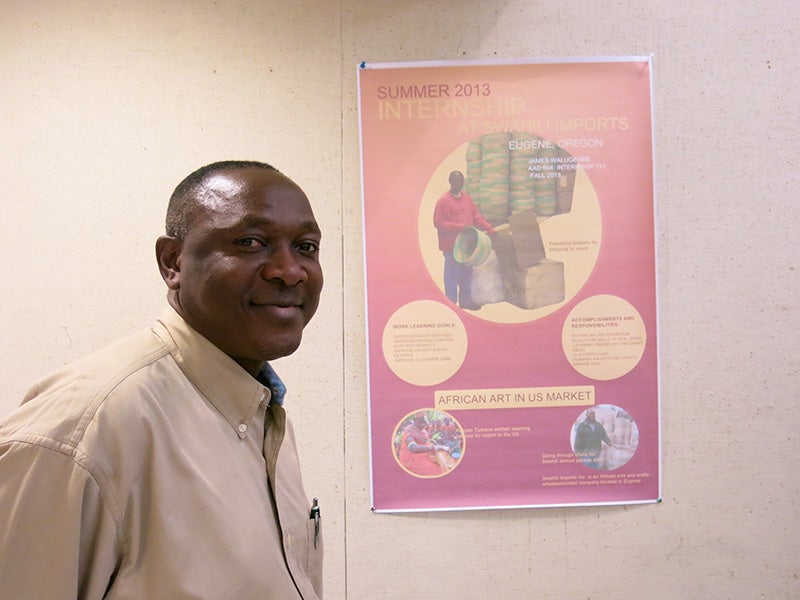
Above: James Walugembe spent his summer interning with Eugene-based company Swahili Imports, Inc. Photograph by Emerson Malone.
Evelyn Thorne, a community arts programmer with a focus in radio, storytelling, and participatory design, was the only student who held two sequential internships with an emphasis in community arts.
The first was as the program and facilitator intern at the Center for Digital Storytelling in Berkeley, California. Thorne worked with a segment of The Center’s curriculum called “Silence Speaks,” which works with human rights issues from women’s rights to HIV and AIDS awareness through digital storytelling. This work allowed Thorne to help facilitate workshops, edit curriculum, and design a new website for the company.
“I learned a lot about the intersection between using storytelling for civic engagement,” she said. “My main interest is storytelling and I would love to do something that has some kind of social action component to it.”
Through her second internship with the Arts and Business Alliance of Eugene, Thorne edited videos of arts and cultural events. Her videos promoted local events and were showcased on the Eugene A Go-Go website.
“It was just putting more interactive content on the website [to] highlight what was happening in Eugene,” she said.
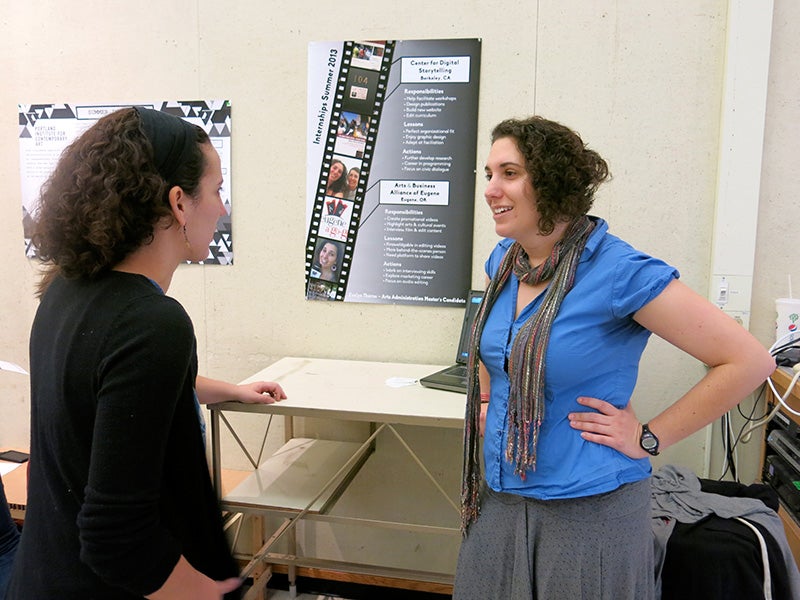
Above: Evelyn Thorne (right) worked with two sequential internships over the summer: the Center for Digital Storytelling in Berkeley, California, and the Arts and Business Alliance of Eugene. Photograph by Emerson Malone.
The concept of repatriation—the return of sacred objects and human remains from museums back to their native culture—is what attracted Mattie Reynolds to her internship.
Reynolds, who is working toward a master’s degree with a concentration in museum studies, was inspired by her Choctaw lineage to land an internship with the Peabody Museum of Archaeology and Ethnology at Harvard University.
She did extensive research about present and ongoing repatriations being completed by the museum.
“I remembered from my undergrad from working with tribal archaeologists, the Peabody had actually repatriated human remains back to my tribe and had a very good working relationship with them. I contacted the repatriation’s director and [asked for a internship],” said Reynolds.
Her internship with the Peabody Museum helped frame her thesis on reducing the length of time to complete an average repatriation and her heritage with the Choctaw Nation of Oklahoma.
“As part of the federal law … museums are legally required to publish an inventory of all their Native American material,” she said. “As a Choctaw, I could go onto the national website and [if I] saw something I think needs to come home, I could talk to my tribal representatives who visit and say it needs to come home.”
Reynolds says she has an interest in encouraging museums to understand the inventory of their artifact collections and collaborating through a multicultural lens.
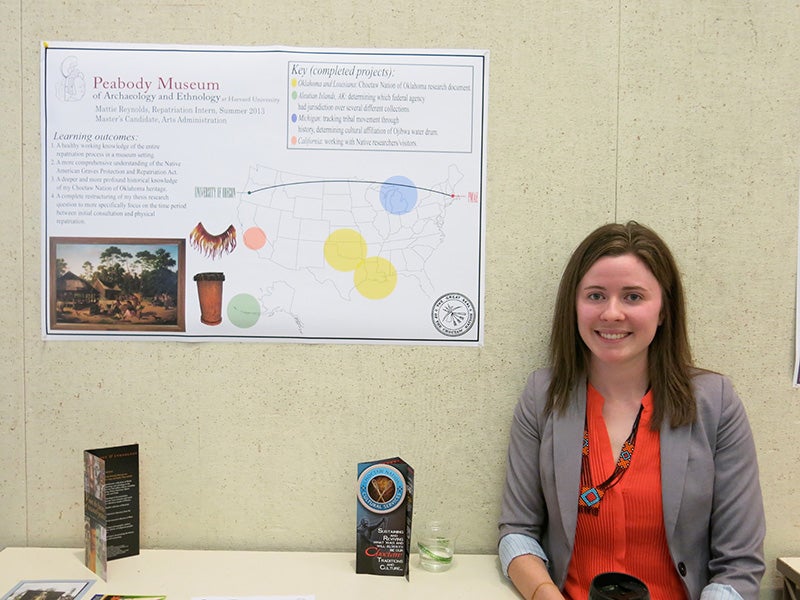
Above: Mattie Reynolds worked at Harvard University's Peabody Museum of Archaeology and Ethnology to research repatriation. Photograph by Emerson Malone.
